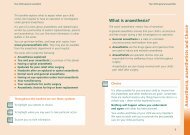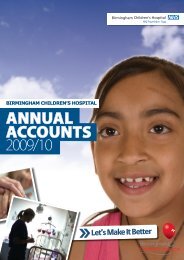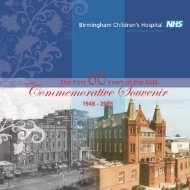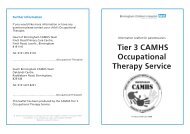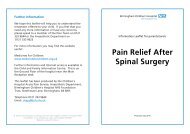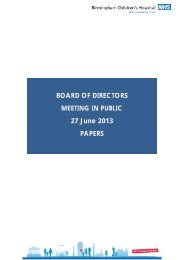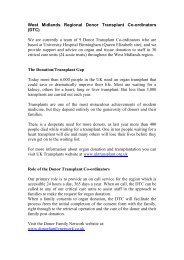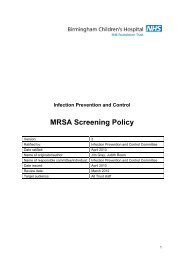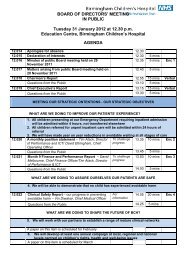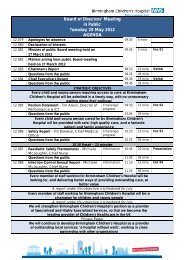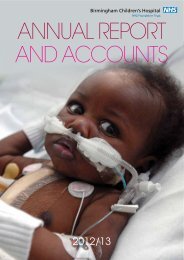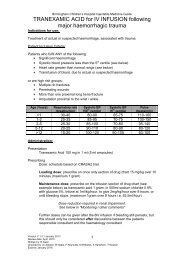Board Meeting Agenda July 2012 - Birmingham Children's Hospital
Board Meeting Agenda July 2012 - Birmingham Children's Hospital
Board Meeting Agenda July 2012 - Birmingham Children's Hospital
You also want an ePaper? Increase the reach of your titles
YUMPU automatically turns print PDFs into web optimized ePapers that Google loves.
Ref. Item Action<br />
• Respiratory arrests, Acute Life Threatening Events and Unplanned<br />
Admissions to ICU: The data shows an increase in Cardiac Arrests, as we<br />
are now including arrests in ICU. We will be separating this data from arrests<br />
on wards to provide clarity. On the wards they have monitoring to prevent<br />
cardiac arrests, so we should see a low incidence but on PICU there are<br />
occasions where the heart may stop suddenly due to the severe nature of the<br />
patient’s condition or where the patient is recovering from surgery. As yet we<br />
don’t fully understand the measures we can put in place to prevent those<br />
cases from happening. This is the same in children’s hospitals worldwide.<br />
• Pressure sores: we are focusing on reducing grade 2 pressure sores and we<br />
are working to ensure we have the correct data to make sure the grading is<br />
done correctly.<br />
• We had two incidents on PICU over recent months, where antibiotics were<br />
not administered until a few hours after diagnosis. In response, as part of a<br />
National Campaign called ‘Surviving Sepsis’ we are piloting an Antibiotic<br />
Care Bundle in ED before roll out to more complex clinical areas. The<br />
process is appended to the report.<br />
KL queried the selection of ED for the pilot rather than a more complex area<br />
where the incidents occurred. VD responded that it was important to test the<br />
scheme in a lower risk environment to ensure it is safe.<br />
• Handover: VD and his team will be speaking at the National Patient Safety<br />
Congress on the work they are doing to improve the quality of handover.<br />
This is a good opportunity to highlight the Trust’s work on patient safety and<br />
for BCH to learn from other organisations.<br />
The <strong>Board</strong> received and noted the report.<br />
There were no questions from the Public.<br />
12.087 Paediatric Safety Thermometer<br />
MM gave a presentation to the <strong>Board</strong>, with the following highlights:<br />
The Safety Thermometer was launched across the region in March <strong>2012</strong>. This is a<br />
tool which measures harm in 4 areas on one day each month:<br />
• Pressure sores<br />
• Urinary Tract Infections<br />
• VTE<br />
• Falls<br />
We piloted the scheme last year and the clinical teams felt that the process could be<br />
valuable. The SHA have now agreed to support the development of a Safety<br />
Thermometer more pertinent to paediatrics.<br />
MM’s team worked with Governance and VD’s team to identify our top 4 areas of<br />
harm and how they could be measured. The SHA then hosted an event to open the<br />
debate to a wider national audience. All organisations identified pressure sores and<br />
extravasation injuries as vital areas, and additionally agreed a measure for ‘no<br />
avoidable pain’. The group also discussed medication omissions but it was felt that<br />
more time is needed to produce a definition for this measure. The group therefore<br />
agreed that the fourth measure will be the paediatric early warning system (PEWS)<br />
6



